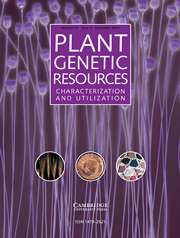Crossref Citations
This article has been cited by the following publications. This list is generated based on data provided by
Crossref.
Islam, Md. Zaherul
Ahn, Soon Young
and
Yun, Hae Keun
2015.
Identification of six transcripts encoding putative receptor-like protein kinase (RLK) and their expression profiles in Vitis flexuosa infected with pathogens.
Scientia Horticulturae,
Vol. 192,
Issue. ,
p.
108.
Hur, Youn Young
Jung, Sung Min
and
Yun, Hae Keun
2015.
Current status and prospects of genomics and bioinformatics in grapes.
Journal of Plant Biotechnology,
Vol. 42,
Issue. 4,
p.
298.
Islam, Md. Zaherul
and
Yun, HaeKeun
2016.
Characterization of nine Mlo family genes and analysis of their expression against pathogen infections in Vitis flexuosa
.
Euphytica,
Vol. 211,
Issue. 3,
p.
379.
Islam, Md. Zaherul
and
Yun, Hae Keun
2016.
Identification and Expression Profiles of Six Transcripts Encoding Carboxylesterase Protein in Vitis flexuosa Infected with Pathogens.
The Plant Pathology Journal,
Vol. 32,
Issue. 4,
p.
347.
Moon, Jin Seok
Hur, Youn Young
Jung, Sung-Min
Choi, Youn-Jung
Nam, Jong-Chul
Park, Jeong-Gwan
and
Koh, Sang Wook
2017.
Transcript profiling of native Korean grapevine species Vitis flexuosa exposed to dehydration and rehydration treatment.
Horticulture, Environment, and Biotechnology,
Vol. 58,
Issue. 1,
p.
66.
Islam, Md. Zaherul
and
Yun, Hae Keun
2017.
Three transcripts of EDS1-like genes respond differently to Vitis flexuosa infection.
Journal of Plant Biotechnology,
Vol. 44,
Issue. 2,
p.
125.
Pirrello, Carlotta
Mizzotti, Chiara
Tomazetti, Tiago C.
Colombo, Monica
Bettinelli, Paola
Prodorutti, Daniele
Peressotti, Elisa
Zulini, Luca
Stefanini, Marco
Angeli, Gino
Masiero, Simona
Welter, Leocir J.
Hausmann, Ludger
and
Vezzulli, Silvia
2019.
Emergent Ascomycetes in Viticulture: An Interdisciplinary Overview.
Frontiers in Plant Science,
Vol. 10,
Issue. ,
Li, Zhi
dos Santos, Ricardo Feliciano
Gao, Linlin
Chang, Pingping
and
Wang, Xiping
2021.
Current status and future prospects of grapevine anthracnose caused by Elsinoe ampelina: An important disease in humid grape‐growing regions.
Molecular Plant Pathology,
Vol. 22,
Issue. 8,
p.
899.
2022.
Full Issue PDF.
Molecular Plant-Microbe Interactions®,
Vol. 35,
Issue. 1,
p.
1.
Li, Zhi
Gao, Linlin
Chang, Pingping
Chen, Ziqiu
Zhang, Xiuming
Yin, Wuchen
Fan, Yanchun
and
Wang, Xiping
2022.
The Impact of Elsinoë ampelina Infection on Key Metabolic Properties in Vitis vinifera ‘Red Globe’ Berries via Multiomics Approaches.
Molecular Plant-Microbe Interactions®,
Vol. 35,
Issue. 1,
p.
15.
Ahn, Soon Young
Kim, Seon Ae
Jo, Sung Hwan
Choi, Doil
and
Yun, Hae Keun
2023.
Characterization of stilbene synthase genes by comparative genome sequencing of Vitis flexuosa with high contents of stilbene compounds to Vitis vinifera genome.
Horticulture, Environment, and Biotechnology,
Vol. 64,
Issue. 2,
p.
283.


